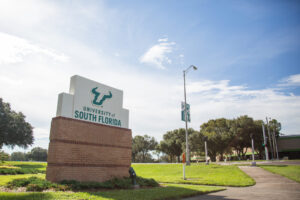Spring COVID-19 guidelines prompt criticism from some faculty members

The university’s measures to ward against the COVID-19 omicron variant have prompted feedback from faculty members, believing online learning would be safer. However, some said it would be impossible given the state legislation set by Gov. Ron DeSantis that prohibits mask and vaccine mandates, as well as transitions to remote learning.
COVID-19 guidelines have experienced little change during the transition from fall to spring semesters. As of Jan. 3, cases will cease to be reported to the USF COVID-19 Assessment Team, and will instead be communicated directly to the Florida Department of Health via the testing site.
Professor in the School of Marketing and Innovation Mike Bowen said he was “torn” over the school’s policies.
“I am at odds myself with what, given the enormity of the pandemic still raging and the number of fully vaccinated students, staff and faculty, would be best to do,” Bowen said.
“The university has been given a mandate for [face-to-face] classes by the governor, and it has shown little interest in paying the penalties the state would levy if we ‘disobeyed’ its orders. Beyond that, there are reasons I can see to go ahead with [in-person classes], some very good reasons that we shouldn’t and many unknowns.”
The first omicron case in Florida was reported Dec. 8 at a Tampa hospital. Between Dec. 24 and 30, Florida averaged 42,600 cases daily, far exceeding the peak of 25,000 cases of the delta variant recorded over the summer.
In a Jan. 5 email from Interim President Rhea Law, she acknowledged concerns about the rapidly spreading variant and expressed the importance of getting vaccinated and wearing a mask. She also encouraged faculty to be more flexible for students who have tested positive for COVID-19 and who would therefore be unable to fulfill the first-day attendance policy.
In response to the university’s plans for the spring semester, President of the USF chapter of UFF Arthur Shapiro wrote an open letter Jan. 5 to Law asking for three weeks of remote learning at the beginning of the spring semester.
The letter cited similar decisions made by schools such as Harvard and Stanford, who have both committed to online beginnings to their spring semesters.
“The one thing we are sure of about omicron is that it is highly transmissible, but that other factors are uncertain,” Shapiro said.
“We recommend that USF join Columbia, Harvard, Yale and numerous other institutions and hold the first few weeks of classes online. This would reduce transmission on campus and give us more time to assess the behavior of the variant — and decide how to deal with it during the rest of the semester.”
USF will not transition to online learning, according to USF Faculty Senate President Timothy Boaz. Due to the state mandates set by DeSantis preventing Florida schools from converting to remote learning without reductions in state funding, Boaz said there is no possibility of UFF’s requests being fulfilled.
“[The transition to in person] is not going to happen,” he said. “Our hands are tied in that regard. I think it would be a well-advised thing to do to help ride out this current surge and not contribute to it more than we have to, and I think being remote would do that.
“I think it’s a good recommendation. And, unfortunately, it’s not going to happen, so we’re just going to have to be more careful in the context of an in-person environment.”
Boaz said he believes the UFF missive likely represents other faculty members’ hopes for online learning during the spring semester.
Due to his vulnerability, Bowen said the virus and mandates to continue in-person learning exacerbated his worries.
“I’m in a very vulnerable age group,” Bowen said. “I’ve been told that if I ever get COVID-19, I would not be in a good spot — I may not make it out. So it’s a great concern to me, and it’s a great concern to me for the students if they are not fully vaccinated.
“If you’re not vaccinated, you’re putting yourself in some serious risk.”
He also noted the drawbacks to completely online learning, mostly around the decrease in student performance in the classroom.
“What they’re turning in is not not up to what we’ve seen over the last 40 years I’ve been doing this, and it’s that’s a real concern for me,” Bowen said. “There’s something lost online … In my own experience, it is just not the same kind of classroom experience.”
However, Bowen said although face-to-face learning has its educational advantages, the importance of one’s health surpasses that of the benefits connected with in-person learning.
Some faculty, such as faculty member I, chose to remain anonymous to avoid retaliation from the school, and believe the school is doing little to manage cases on campus.
“We are no longer reporting positive cases to the university, effectively throwing our hands in the air,” faculty member I said.
Faculty member II, who also chose to remain anonymous to avoid retaliation from the school, said they were disappointed in the measures taken by USF, and they believe the school is neglecting its community.
“It’s clearly not safe right now so I know many teachers are concerned about this,” faculty member II said. “Many of us have shared our concerns but worry USF cares more about pleasing the governor than they do about public health.”
Faculty member I said other schools are adjusting their spring semesters to accommodate the virus, and they believe USF is using the community solely for the funding it provides.
“I am watching universities around the country put plans in place, as USF continues to act as if nothing is happening,” faculty member I said.
“We are nothing more than a way for this university to continue making money. The message here is clear — every human life is replaceable to USF.”






